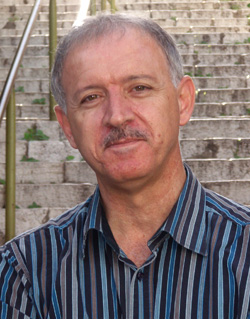
Ameer Makhoulâs perpetual trial
Audrey Farber writing from Haifa, Live from Palestine,
After being held without charge, tortured and denied access to an attorney for three weeks, the State of Israel accused Ameer of trumped-up charges of espionage. As it frequently does in “security cases,” the Israeli government based its accusation on “secret evidence” that Ameer and his legal defense had no access to. It became clear that Ameer’s arrest and the charges against him was an attempt to scare Palestinian citizens of Israel into submission. Ameer has stood for court dates almost monthly since being arrested, and little progress has been made. There has been talk of a plea bargain, but no judge has read a sentence and his trial has become a monthly meeting of his nearest and dearest, testifying to his commendable character and good standing in the community.
Today’s hearing was supposed to begin at 9am but was pushed back. The room — even though there is a horde of people outside waiting to get in — has only two benches for spectators. There are empty courtrooms with five or six benches, enough to easily accommodate all interested parties.

Ameer Makhoul (Adri Nieuwhof)
But instead we’re outside the door, while two, sometimes three, behemoth security guards control the door and glare at us intimidatingly. Milling around is a veritable who’s who of Haifa politics and activism. A Jewish member of the Communist party who is on city council comes out after giving testimony and hobnobs with influential activists, former Members of Knesset, employees of various nongovernmental organizations in Haifa, international activists, journalists, powerful lawyers and friends and family of Ameer. It’s a bit unnerving to realize that if they wanted, Israeli intelligence agents could show up outside this courtroom, arrest everyone standing there, and essentially silence all dissent in Haifa. All the major players in one place, for one cause.
As two people come out, two are let in. One comes out, one goes in. Then two come out, and the ogres at the door decide no one else is allowed in. Some among us start arguing with them, calling them out on their arbitrary change of policy, but they’re enjoying their show of strength too much. They tell us to move over; we have to wait from the side, for no apparent reason. They bring in those extendable line-makers, like those found in movie theaters and airports, and create a space where they can stand with their arms crossed, surveying their prey, a space we’re not allowed to enter. There is an easy parallel between this charade and the political situation here; we are told where we can stand, what we can do, and whether or not we are allowed in.
And just like that, it’s over. People come flooding out; greeting and kissing each other on the cheek, saying hello to friends and family and colleagues. Ameer’s wife and daughters come out into the crowd, so do his sisters and his brother, observers from European embassies, community members, then the lawyers. Some of the best lawyers in Israel were there, and still, this trial continues. It’s court date after court date of unanimously supportive character witness testimony. The prosecution has no evidence to present, at least not in a public hearing; such is the nature of these “security cases.” There was supposed to be a decision on his sentence today, but there wasn’t, and there will be yet another court date in January with more and more character witnesses, more and more people testifying in support of Ameer Makhoul. But there is irony in this; the longer they can postpone sentencing him, the longer he stays in jail, unable to kiss his wife, or hug his daughters. We can spend years and years giving positive testimony in support of Ameer but if he is not sentenced, he stays in jail, perpetually on trial.
When his younger daughter came out of the courtroom, I read her eyes. She is brave, so brave. I cannot imagine going through what she is enduring. Month after month she comes to these trials, sees the community supporting her father, perhaps once in a blue moon she can hold his hand. His sister was allowed to hug and kiss him for the first time today, but when Ameer’s wife visits him in prison they are permitted only to communicate through a telephone and a glass barrier. He is perpetually sealed off from his family. His daughter floats through the crowd, puts on a smile, hugs her aunts and uncles and shakes hands with her father’s colleagues. When they look away, her face falls, and her eyes are sad, almost empty, resigned in a way to his fate. She has gone through too much for an adolescent girl. Still she, and Ameer’s entire family, and the entire community, tirelessly fight for his rights. But with each farcical trial date, perpetuating this charade of “justice,” it seems less and less likely that these rights will ever be realized, a decision will be made, and he will be released, able to join his family at their home once again.
Audrey Farber is a writer, activist, photographer and brain-for-hire who most recently interned at Mada al-Carmel – Arab Center for Applied Social Research, in Haifa.
alethonews.wordpress.com/2010/12/22/ameer-makhouls-perpetual-trial/
Dec. 20, 2010
